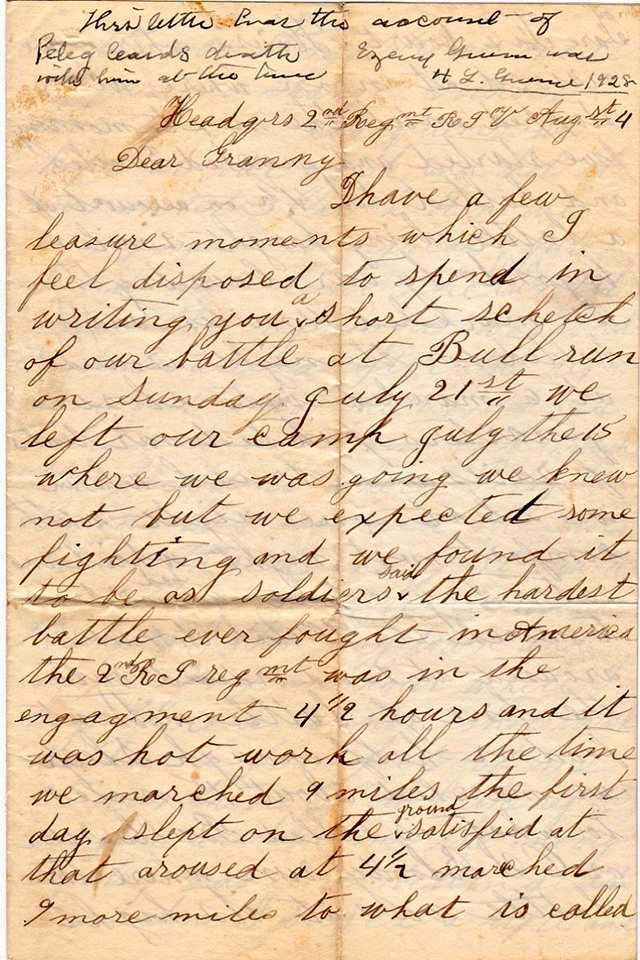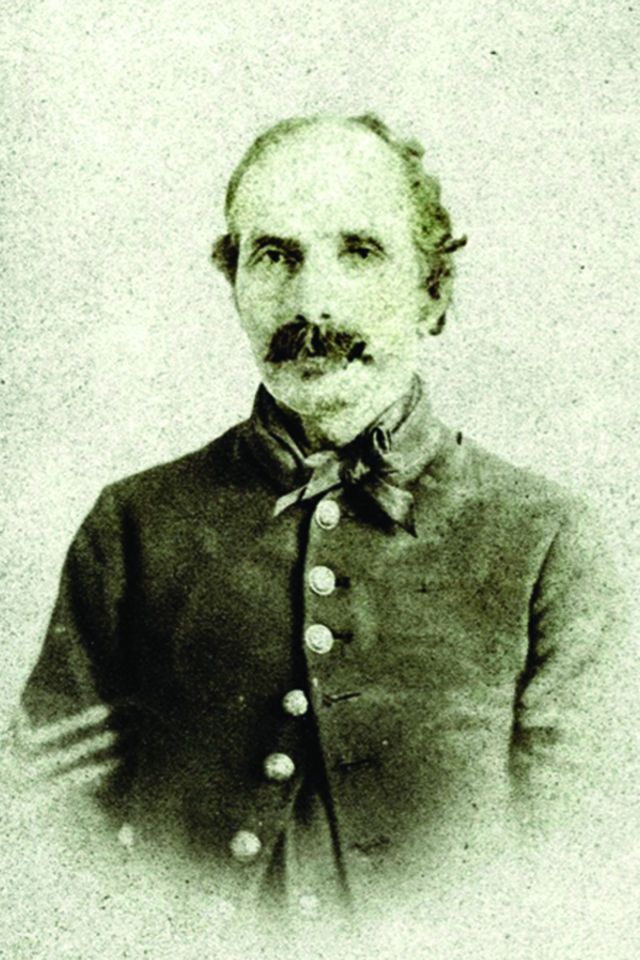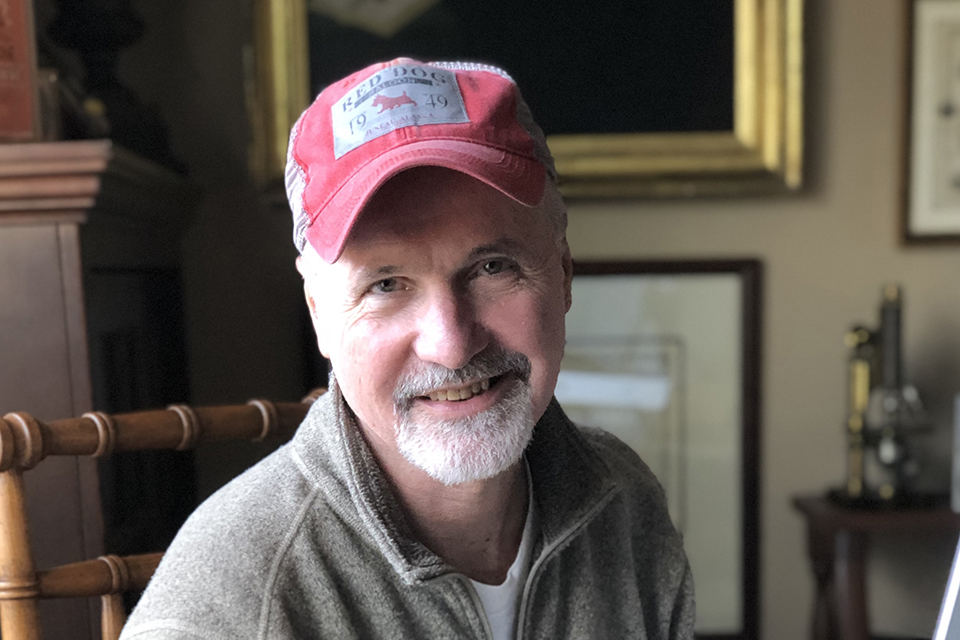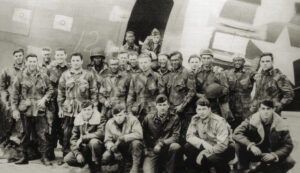William Griffing’s passion is pecking out soldiers’ words for posterity
[divider_flat]WHEN HE CAN’T SLEEP at night, William Griffing sometimes will slip out of bed, walk several steps to his second-floor home office and plop his weary body into a brown, wooden chair in front of his Mac. He’s surrounded by historical artifacts and oddities in this ample-sized room in his house in Batavia, Ill., 35 miles west of Chicago. On a beige wall hangs a neatly framed sampler created by his great-great grandmother in 1841; on a shelf rests a framed piece of sealskin from Adolphus Greely’s expedition to the Arctic Circle in 1884.
[divider_flat]After Griffing wipes the sleep from his eyes, he puts on his reading glasses, fires up his computer and bellies up to a desk that once was his mother’s dining room table. Then the magic begins: Typing only with his right hand, he transcribes wartime correspondence of Civil War soldiers, an obsession for the 66-year-old retiree.
Usually, Griffing works from scans; occasionally, he transcribes original letters or diaries. He averages 60 to 70 words a minute, sometimes 100 when he’s at peak performance. The process can be tedious, especially if the handwriting is difficult to read. He approaches transcribing like a job, working eight to nine hours a day.
When he’s finished transcribing, Griffing—you can call him “Griff”—transforms into a tenacious detective for what he calls his “forensic analysis.” If a letter doesn’t include the soldier’s name, he looks for clues in the correspondence that may help him discover his identity. A regimental designation, the soldier’s company, troop movements in the area, a cousin’s first and last name—any of these bread crumbs within a letter could lead to an ID. Ancestry.com or another genealogy site often aid his forensics work. Along with information he writes about the soldier, Griffing posts the primary source material online to a remarkable group of websites called Spared & Shared.
Griff estimates he has posted online thousands of letters and a dozen diaries. Soldiers in regiments from Alabama to West Virginia are represented on Spared & Shared. Griffing’s websites also include the written words of U.S. Colored Troops, sailors, Veteran Reserve Corps soldiers—even a U.S. Signal Corps member. He has created more than 100 Spared & Shared websites—mostly from his home base in Illinois, sometimes from his retirement home in Arizona. Nowadays, Griff transcribes and posts three to five letters a day.
He calls it “exhilarating.” Readers have noticed.
“A tremendous resource of rare materials,” a commenter posted to Griffing’s Spared & Shared Facebook page. “You should,” wrote another, “do a post on your techniques!”
When Griffing entered college decades ago, he thought he might want a career in American history. That thought quickly evaporated, and he pursued a more lucrative option. He eventually took a position in the environment, safety, and health field as a director at the Fermi National Accelerator Laboratory in Chicago.
But Griff never lost his keen interest in American history—an interest spurred at a young age by his grandfather, a Kansas farmer who was a voracious reader of history and often shared stories of the family’s military service. Beginning in 1990, Griff transcribed the mid–19th century correspondence between his great-great-grandparents—roughly 500 letters, which eventually he posted online. “I know them better than I know my grandparents,” he says with a laugh.
When Griffing, an avid golfer, retired in 2012, he hit the links. He also threw himself into transcribing soldier letters like never before.

Griffing eventually connected with collectors of letters. He offered to transcribe the correspondence for free if they’d let him post the letters online. “Deal,” many of them said. For a collector, Griffing’s transcriptions and background research are invaluable. As fascinated as he is by the information he transcribes, Griff has little interest in collecting the letters and diaries themselves. What they say is what matters to him, and he wants to make the content available to researchers and others “before they go into another drawer.”
Although Griffing has transcribed and posted non-Civil War correspondence, he is especially passionate about wartime soldier letters. Correspondence posted on the Spared & Shared sites ranges from the mundane to the magnificent. Battle letters can stir the soul. Some may break your heart.
In a letter to his parents, Private Charley Howe of the 36th Massachusetts struggled to describe the horror of Antietam. “Passing to another barn I saw it was full of men with arms and legs off,” he wrote on September 21, 1862, four days after the battle. “I will not attempt to describe the scene. Some were having legs taken off. The surgeon administers chloroform and then goes to work like a butcher. He is only four minutes to amputating a leg and you can judge how carefully he works.”
After he left the makeshift hospital, Charley visited the battlefield. “O God,” he wrote. “Pen cannot describe the sight.” Union soldiers were buried in marked graves, Howe wrote, while “the rebs are planted ‘unwept, unhonored, and unsung.’ I could only wish that there were a thousand times as many more of them to be sunk in the earth.”
Howe, the son of a mill hand, had begged his parents to let him enlist. He was captured in December 1863 while foraging in Rutledge, Tenn. Charley died on August 27, 1864, at Andersonville, Ga., one of the war’s most notorious POW camps. He was 19 years old.
On the website dedicated to Howe’s wartime writing, the teenager’s tragic saga comes to life in his own words. “Charley literally matures before our eyes in the two years of letters that are presented here,” Griffing writes as an introduction to dozens of Howe’s letters on the webpage. We may never have known about the private were it not for Griff’s work.
In another Spared & Shared letter, Ezra Greene of the 2nd Rhode Island described the First Battle of Bull Run to his grandmother as “hot work.” While the private’s regiment rested in the woods, he ventured back onto the battlefield, where a wounded comrade named Pelig W. Card lay. Card lived only for another hour or so.
As the battle swirled, an exhausted Greene fell asleep as he lay on the ground. He slept for 45 minutes, he wrote, until a cannon shot crashed a few feet from him. When Greene looked around, he discovered he was alone. Enemy cavalry was nearby, but he somehow escaped to fight another day. “It is like being in state prison,” Greene wrote to “Granny” about soldiering, “for we cannot leave the ground and have to do as the officers say and when they please.”
Digging deeper into Greene’s story, Griffing discovered the relationship between Greene and Card: The young men were cousins and messmates. He posted that golden nugget online with Greene’s letter.
“I take pride and take care in the way I present the letters,” says Griffing, “because I feel like I’m honoring the soldiers’ service in preserving their words.” A self-taught illustrator, he creates his own artwork for his sites. When he can find one, he posts an image of the soldier letter-writer.
Sometimes Griffing’s work is especially gratifying. Several years ago, he posted a letter from the collection of a North Carolina relative. “My Dear Jamie,” Samuel McClure’s letter began to his son, James, a lieutenant in the 8th Wisconsin who was serving in Louisiana. The elder McClure was sergeant in the 31st Wisconsin Infantry.

“We have, in fact, a terrible crisis to pass after the Rebellion is broken to fragments—arising out of the same fragments of a fierce and bloody character and partaking to some extent of the character of civil war,” Samuel wrote from Murfreesboro, Tenn. “But I trust that another Presidential Term of the Savior of the Union—Abraham Lincoln—will restore the country fully to the possession of loyal men and drive out all the disloyal.”
The father included a carte-de-visite of himself with the letter. “I believe it looks rather worse than the subject tho’ that is not my fault,” Samuel wrote, “for I paid for a good one.” James never saw it. “When this letter reached the Regt.,” a captain in the 8th Wisconsin wrote in ink on the envelope addressed to James, “Lt. McClure was dead. Killed on the Red River Expedition.”
When a descendant of the McClures saw the letter online, she contacted Griffing. The woman was thrilled. Her family had been unaware of the correspondence and the photograph of Samuel McClure in uniform. Griff alerted his North Carolina relative, who sent the descendant the original letter and CDV. Grateful, she sent Griffing typewritten copies of wartime diaries and correspondence of James and Samuel McClure for posting online.
Having transcribed thousands of letters, Griffing feels qualified to offer observations about the writing ability of Civil War soldiers. Correspondence by New Englanders is well-written. “I’m dumbstruck by some of the words they used,” he says. “They have a better vocabulary than kids today.” Quality declines among Midwesterners: “Indiana soldiers, my God, I can hardly read what they wrote sometimes.” And letters from Southerners, he says, are generally “written so poorly, and they are hard to make out, too.”
No matter where the writer comes from, Griffing relishes the rush he gets when he examines an original soldier letter for the first time. “The feeling of excitement I experience in opening a letter and not knowing what it says or what it might reveal,” he says, “keeps me coming back and opening more letters.”
Griff has no idea how long he’ll stick with his unusual hobby. The supply of Civil War soldier letters seems limitless. “It’s amazing this stuff keeps pouring out of attics,” he says. He fears back pain or carpal tunnel could put him on the disabled list someday.
But even his wife, Rosemary, often skeptical about his obsession, has grudging appreciation now for his work.
“I think she’d like it a whole lot better though,” he says with a chuckle, “if I was making some money at it.” ✯
John Banks is the author of the popular John Banks Civil War Blog. He lives in Nashville, Tenn.





